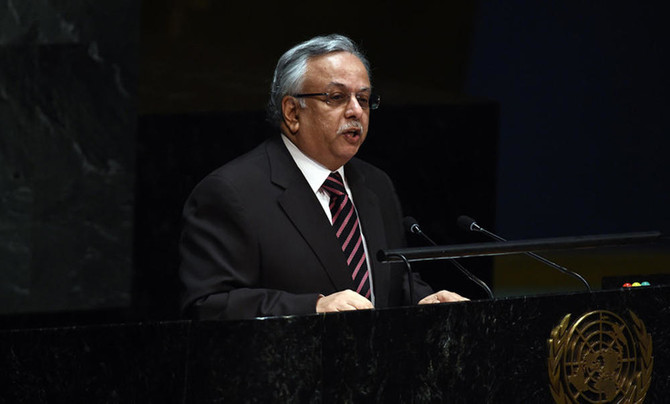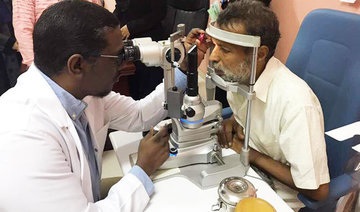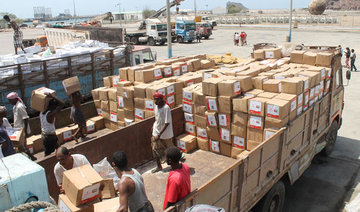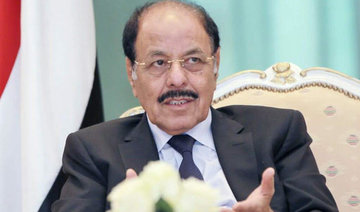NEW YORK: The Saudi-led military coalition fighting in Yemen will reopen some of the country’s ports and airports within hours, though a key aid route will stay shut until Riyadh clamps down on weapons smuggling, a Saudi envoy said on Monday afternoon in New York.
Riyadh’s ambassador to the UN, Abdallah Al-Mouallimi, told reporters that the government-held ports in Aden, Mukala and Al-Mokha, as well as airports in Aden, Seiyun and Socotra, would be opened “within the next 24 hours.”
“We would like to confirm that steps are being taken by the coalition… to start the process of reopening airports and sea ports in Yemen to allow for the safe transfer of humanitarian actors and humanitarian and commercial shipments,” said Al-Mouallimi.
Other ports, including Houthi-controlled Hodeidah — where some 80 percent of Yemen’s food supplies transit — will remain shut until a UN verification regime is reviewed to ensure no arms reach the Houthis, the ambassador added.
He called on UN Secretary-General Antonio Guterres to send a delegation to Riyadh to “review current procedures to enhance and deliver a more robust verification and inspection mechanism aimed at facilitating the flow of humanitarian and commercial shipments while preventing the smuggling of weapons, ammunition, missile parts and cash.”
The Saudi-led coalition closed all air, sea and land access to Yemen last week following the interception of a missile fired toward the Saudi capital, saying it had to stem the flow of arms to Yemen’s Houthi rebel group from Iran.
Saudi Arabia has accused arch-foe Tehran of supplying the ballistic missile which was shot down near Riyadh airport without causing any casualties. Iran has denied the accusation. Al-Mouallimi pointed to the Iran-backed Hezbollah militia.
“Hezbollah is active in Yemen on the ground, and... they are active in supporting the Houthis in operating, preparing, reassembling such missiles and launching them — including the one that was launched into Saudi Arabia,” Al-Mouallimi said.
The UN and international aid groups have repeatedly critiqued the coalition in the past for blocking aid access, especially to northern Yemen, which is held by the Iran-aligned Houthis battling the Saudi-led coalition.
On Monday, UN spokesman Stephane Dujarric warned that two thirds of Yemen’s population — more than 17 million people — rely on food handouts and said that unless the blockade is wholly lifted the “situation will deteriorate further.”
The UN’s World Food Programme will run out of rice in 111 days, while wheat stocks will end in 97 days, he said. “Unless the Red Sea ports in Hodeidah and Salif are open immediately, the UN will not be able to feed 7 million people every month,” Dujarric added.
More than 10,000 people have been killed in the war, which pits the internationally recognized government, backed by Saudi Arabia and its allies, against the Houthis and forces loyal to former President Ali Abdullah Saleh.
The Saudi-led coalition has been targeting the Houthis since they seized parts of Yemen in 2015, including the capital Sanaa, forcing President Abed Rabbo Mansour Hadi to flee and seek help from neighboring Saudi Arabia.
Yemen ports to open ‘within 24 hours’: Saudi envoy
Yemen ports to open ‘within 24 hours’: Saudi envoy

Saudi women embrace natural beauty: a fresh take on changing standards

- Trend focuses on simplicity over perfection
- Consumers take more mindful approach
RIYADH: Women in Saudi Arabia have been embracing a more natural approach to their beauty routines in recent years, focusing on sustainability, health and authenticity over heavy makeup and curated perfection.
Arab News spoke to several women who described how this trend reflects a deep alignment with personal and societal values — prioritizing routines that enhance their natural features while promoting overall well-being and environmental sustainability.
For Laila Al-Ghamdi, this change is personal. “A few years ago, I would say natural beauty was everything to me. As a young teenager, my whole world used to revolve around the epitome of beauty,” she said. “Nowadays, healthier choices are influencing my decisions, and ironically, they’re the ones that make me prettier.”

This shift is supported by local brands that cater to these changing standards. One standout is LOCA Beauty, a Saudi brand with a focus on sustainability that was founded in 2018.
“LOCA Beauty was born out of a desire to provide innovative solutions that align with the Saudi lifestyle,” said Mai Al-Mohaimeed, marketing director of LOCA. “We focus on natural ingredients and sustainable packaging, which resonates deeply with our customers.”
Similarly, Asteri, another brand, empowers women with vegan products that withstand harsh weather conditions while celebrating the region’s natural beauty.
Beauty is no longer about fitting into a mold. It’s about feeling good in your own skin and celebrating who you are.
Munira Al-Ahmad, Local
Sustainability is central to the natural beauty movement in Saudi Arabia. Consumers are increasingly conscious of the environmental and health effects of their purchases. Local brands are rising to meet this demand with eco-friendly materials and safe ingredients.
Glossig, inspired by Saudi Arabia’s desert landscapes, combines cultural storytelling with artistic innovation to enhance individuality. Meanwhile, Mai Ward and Jayla emphasize sustainability and luxury — Mai Ward celebrates Saudi heritage through handcrafted, sustainable products, while Ladeena focuses on organic solutions, delivering skin-friendly products infused with natural oils and butters.

For women like Rawan Al-Zahrani and Munira Al-Ahmad, these brands have become trusted choices.
“I love how LOCA products feel luxurious yet sustainable. Their makeup products are my go-to because they offer such an amazing glow to my skin,” Al-Zahrani said.
Al-Ahmad, meanwhile, praised Asteri for its innovative solutions. “Asteri’s products feel like they’re made for me — lightweight but effective, perfect for our environment,” she said.

Social media has also played a transformative role in this cultural shift. Platforms such as Instagram have become spaces for clean beauty enthusiasts to share tips and inspire others. Influencers highlight natural products and promote mindful consumerism.
“I follow several Saudi influencers who promote natural beauty and share tips on skincare and makeup,” Al-Zahrani said. “Their advice has helped me simplify my routine and focus on products that work for me.”
While local brands are thriving, they face significant challenges in competing with international giants. In a market saturated with global names it is difficult for smaller brands to stand out.

“Being a local beauty brand presents both opportunities and challenges,” Al-Mohaimeed said. “This also provides us with an opportunity to emphasize what sets us apart — our deep understanding of the Saudi market and the cultural nuances that shape our consumers’ needs.”
Changing beauty standards also reflect a generational change. Younger Saudis are more open to challenging traditional norms and exploring new ideas, driving innovation in the beauty industry. Natural beauty is becoming more about celebrating individuality and authenticity.
“Beauty is no longer about fitting into a mold,” Al-Ahmad said. “It’s about feeling good in your own skin and celebrating who you are.”
By choosing products and routines that align with their values, Saudi women are redefining the beauty industry, shaping a more sustainable future one natural step at a time.
GCC secretary general receives British ambassador to Saudi Arabia

- Albudaiwi emphasized the importance of strengthening relations between the GCC and the UK within the framework of their strategic partnership
RIYADH: Secretary-General of the Gulf Cooperation Council Jasem Albudaiwi received UK Ambassador to the Kingdom Neil Crompton at the GCC Secretariat headquarters in Riyadh on Tuesday.
During the meeting, they discussed the progress of negotiations on the free trade agreement signed between the GCC and the UK and reviewed the latest regional and international developments, the General Secretariat wrote in a statement.
Albudaiwi emphasized the importance of strengthening relations between the GCC and the UK within the framework of their strategic partnership, serving the aspirations and mutual interests of both sides.
Saudi authorities warn of inclement weather as country braces for heavy rainfall

- Riyadh received the season’s first rainfall with an umbrella of cloud enveloping the city skyline on Tuesday
- Makkah, Madinah and Jeddah received heavy rainfall on Monday with floods in low lying areas
RIYADH: Saudi Arabia’s meteorology authorities have forecast more rain accompanied by thunderstorms across several regions, with a red alert in Makkah, Asir and Baha regions due to the inclement weather.
The National Center for Meteorology forecast moderate to heavy rainfall, accompanied by thunderstorms, hail and strong winds in parts of Asir, Al-Baha and Makkah.
Fog may form in some areas of these regions, it added.
Temperatures will drop and frost may form in the northern parts of the Kingdom, according to the NCM.
It added that dust-stirring winds will blow and rain may fall in parts of Riyadh, Qassim, the Eastern Region and Jazan regions.
Meanwhile, Riyadh received the season’s first rainfall with an umbrella of cloud enveloping the city skyline on Tuesday. Some areas in the capital also were lashed by hail.
Makkah, Madinah and Jeddah received heavy rainfall on Monday with floods in low lying areas, forcing the Civil Defense to warn against venturing into flooded areas and valleys.
The General Directorate of Civil Defense has issued warnings and safety instructions, as the country braces for heavy rainfall, urging the public to stay at home, avoid valleys and waterlogged areas, and adhere to all safety directives.
“We follow the weather conditions in some areas of the Kingdom, and call for staying away from valleys and water bodies,” the Civil Defense posted on X.
“During rain, stay away from low-lying areas, water pools and deep valleys,” it added.
Makkah Governorate on X posted several videos of heavy rains, thunderstorm and waterspouts.
Social media is filled with videos from the holy cities of Makkah and Madinah, and the Red Sea City of Jeddah, showing streets and city roads flooded, and cars submerged as result of heavy rainfall.
According to the NCM, winds over the Red Sea will be northeasterly to northerly in the northern and central parts, and southeasterly to southwesterly in the southern part at speeds of 20-50 km per hour. Waves may range from one meter and a half to more than two meters, and the sea will be relatively calm to choppy.
KSrelief delivers critical food, shelter aid to Syrian families

- Saudi aid agency also launches voluntary program to support Syrian healthcare sector
RIYADH: Saudi aid agency KSrelief on Tuesday distributed food and shelter aid to 200 families in the city of Douma, in the Rif Dimashq governorate of Syria, in coordination with the Syrian Arab Red Crescent.
Also on Tuesday, KSrelief distributed food and shelter aid in the village of Nasib, in the Daraa governorate, the Saudi Press Agency reported.
To date, seven planes carrying food, medical supplies, and shelter materials have arrived at Damascus International Airport as part of a Saudi relief airlift.
Additionally, 60 Saudi trucks containing essential supplies, including food, shelter materials, and medical supplies crossed the Nasib Border Crossing into Syria as part of a Saudi relief land bridge operated by KSrelief.
On Jan. 1, Saudi Arabia launched an initiative to provide essential aid to Syria, supporting efforts under the country’s new leadership to rebuild after years of civil war.
According to KSrelief, the Kingdom’s total aid to the Syrian people from 2011 to the end of 2024 exceeds $856 million.
Recently, Syrian Minister of Social Affairs and Labor Fadi Al-Qassem met with the KSrelief team in Damascus, where they discussed ways to deliver aid to the Syrian people and coordination between the Saudi aid agency and civil society organizations in the country.
Al-Qassem commended the support provided by Saudi Arabia through KSrelief and praised the Kingdom’s prompt response to the humanitarian situation in Syria.
Syrian Minister of Health Dr. Maher Al-Sharaa also met with the KSrelief team and discussed ways to contribute to addressing the needs of the Syrian healthcare sector.
Meanwhile, in Lebanon, KSrelief continues implementing its project to enhance healthcare services for Syrian refugees and the host community in the town of Arsal.
In one month, the Arsal Primary Health Care Center received 12,676 patients and provided 23,386 services across various departments.
The initiative is part of Saudi Arabia’s ongoing humanitarian efforts to alleviate the suffering of those in need, particularly Syrian refugees affected by the ongoing humanitarian crisis.
KSrelief also announced the opening of registration for the Saudi Voluntary Program for Syrians. The program aims to support the Kingdom’s humanitarian efforts by providing critical emergency and medical services to Syrians in need.
The initiative covers surgery, psychological support, gynecology and obstetrics, orthopedics, internal medicine, pediatrics, physiotherapy, speech and communication therapy, and prosthetics, among other treatments.
Registration is available here.
Al-Ahsa’s bishts are exquisitely tailored, rich cultural symbols

- Known across the Arab world for their elegance, quality and intricate embroidery
RIYADH: Al-Ahsa is known for its diverse industries and handicrafts, particularly the Hasawi bishts, which are sought-after across the Arab world for their exquisite tailoring, quality and intricate embroidery.
The Hasawi bisht is favored by dignitaries, officials and businesspeople for its aesthetics as well as the rich culture it represents, the Saudi Press Agency reported recently.
They come in dark or light fabrics depending on taste, the occasion and season.
These garments are often adorned with silk thread, as well as golden and silver zari embroidery in shades of yellow, reddish hues, and white, the SPA reported.
Handmade bishts continue to be in demand despite machine-made options.
Certain families in Al-Ahsa and elsewhere in the Kingdom are renowned for their expertise in crafting handmade and artisanal bishts, with meticulous attention to design, shape and embroidery.
Prices vary based on craftsmanship, fabric quality, and the type of zari used. Fabrics from Japan or Kashmir, along with German zari, are factors in determining cost.
Winter bishts, woven from camel hair, come in varying quality and are distinguished by their thickness and weight compared to those made for summer.
Bisht fabrics are woven in Saudi Arabia, Syria and Jordan, with China and India offering similar manufactured options, the SPA added.
The embellishment of the winter Hasawi bisht initially had silk thread, and later incorporated golden and silver.
Stitching the karmuk, the wide section adorned with zari, can take 14 days by hand, while a machine can complete the task in two hours.























